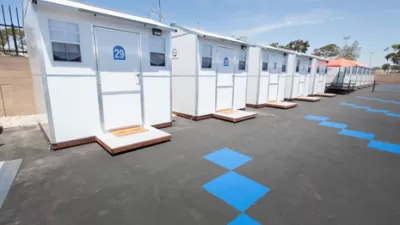Cheap construction materials, crowdfunding, and volunteer construction crews have produced villages of tiny homes as a place for the homeless to find shelter in every corner of the United States. What does it take for such homes to work?
Brendan O'Brien reports on a growing village of tiny homes in Madison, Wisconsin, originally built by the Occupy Madison group to shelter the homeless. The Madison group is one example of a few around the country—including in New York, Texas, and Washington—where tiny homes are providing shelter for the homeless.
In Madison, the hope is to eventually build 30 homes. The materials for each home cost about $5,000—so far one home is complete and two more are under construction. According to O'Brien "In Newfield, New York, organizers plan 14 to 18 tiny houses on private land with private donations. In Austin, Texas, the plan is to build a village of tiny houses and small shelters for 200 people on 27 acres."
O'Brien quotes Steve Berg of the National Alliance to End Homelessness in describing how programs like these can help the homeless find permanent shelter: "The essential element is a stable residence and any kind of a network of supports," says Berg.
As pointed out by previous coverage of the use of tiny houses to shelter the homeless, zoning and building codes often prevent the construction of tiny-houses.
FULL STORY: Tiny houses a way off the streets for Wisconsin homeless

Maui's Vacation Rental Debate Turns Ugly
Verbal attacks, misinformation campaigns and fistfights plague a high-stakes debate to convert thousands of vacation rentals into long-term housing.

Planetizen Federal Action Tracker
A weekly monitor of how Trump’s orders and actions are impacting planners and planning in America.

In Urban Planning, AI Prompting Could be the New Design Thinking
Creativity has long been key to great urban design. What if we see AI as our new creative partner?

Florida Seniors Face Rising Homelessness Risk
High housing costs are pushing more seniors, many of them on a fixed income, into homelessness.

Massachusetts Budget Helps Close MBTA Budget Gap
The budget signed by Gov. Maura Healey includes $470 million in MBTA funding for the next fiscal year.

Milwaukee Launches Vision Zero Plan
Seven years after the city signed its Complete Streets Policy, the city is doubling down on its efforts to eliminate traffic deaths.
Urban Design for Planners 1: Software Tools
This six-course series explores essential urban design concepts using open source software and equips planners with the tools they need to participate fully in the urban design process.
Planning for Universal Design
Learn the tools for implementing Universal Design in planning regulations.
Gallatin County Department of Planning & Community Development
Heyer Gruel & Associates PA
JM Goldson LLC
City of Camden Redevelopment Agency
City of Astoria
Transportation Research & Education Center (TREC) at Portland State University
Jefferson Parish Government
Camden Redevelopment Agency
City of Claremont




























